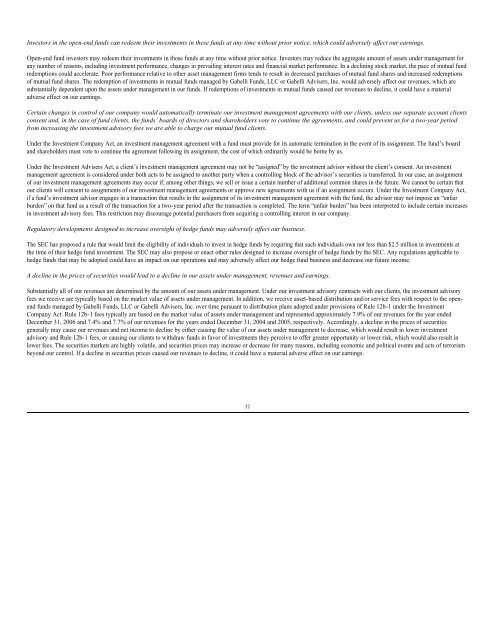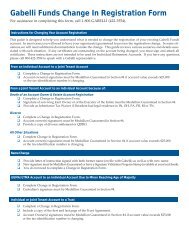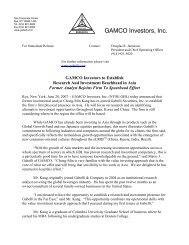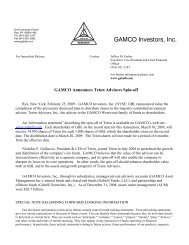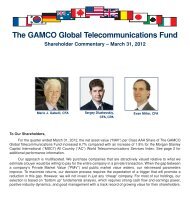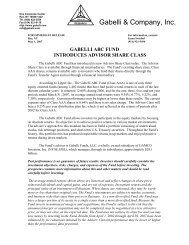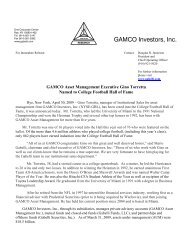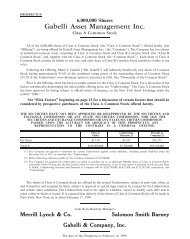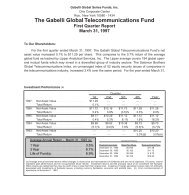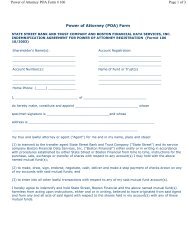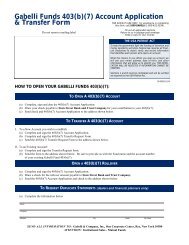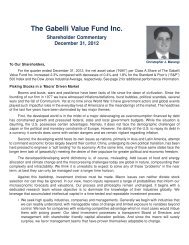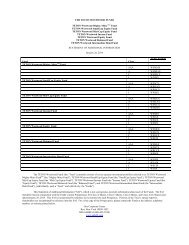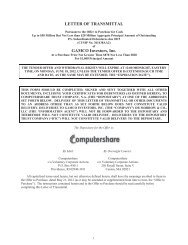FORM 10-K/A GAMCO Investors, Inc. - Gabelli
FORM 10-K/A GAMCO Investors, Inc. - Gabelli
FORM 10-K/A GAMCO Investors, Inc. - Gabelli
- No tags were found...
You also want an ePaper? Increase the reach of your titles
YUMPU automatically turns print PDFs into web optimized ePapers that Google loves.
<strong>Investors</strong> in the open-end funds can redeem their investments in these funds at any time without prior notice, which could adversely affect our earnings.<br />
Open-end fund investors may redeem their investments in those funds at any time without prior notice. <strong>Investors</strong> may reduce the aggregate amount of assets under management for<br />
any number of reasons, including investment performance, changes in prevailing interest rates and financial market performance. In a declining stock market, the pace of mutual fund<br />
redemptions could accelerate. Poor performance relative to other asset management firms tends to result in decreased purchases of mutual fund shares and increased redemptions<br />
of mutual fund shares. The redemption of investments in mutual funds managed by <strong>Gabelli</strong> Funds, LLC or <strong>Gabelli</strong> Advisers, <strong>Inc</strong>. would adversely affect our revenues, which are<br />
substantially dependent upon the assets under management in our funds. If redemptions of investments in mutual funds caused our revenues to decline, it could have a material<br />
adverse effect on our earnings.<br />
Certain changes in control of our company would automatically terminate our investment management agreements with our clients, unless our separate account clients<br />
consent and, in the case of fund clients, the funds’ boards of directors and shareholders vote to continue the agreements, and could prevent us for a two-year period<br />
from increasing the investment advisory fees we are able to charge our mutual fund clients.<br />
Under the Investment Company Act, an investment management agreement with a fund must provide for its automatic termination in the event of its assignment. The fund’s board<br />
and shareholders must vote to continue the agreement following its assignment, the cost of which ordinarily would be borne by us.<br />
Under the Investment Advisers Act, a client’s investment management agreement may not be “assigned” by the investment advisor without the client’s consent. An investment<br />
management agreement is considered under both acts to be assigned to another party when a controlling block of the advisor’s securities is transferred. In our case, an assignment<br />
of our investment management agreements may occur if, among other things, we sell or issue a certain number of additional common shares in the future. We cannot be certain that<br />
our clients will consent to assignments of our investment management agreements or approve new agreements with us if an assignment occurs. Under the Investment Company Act,<br />
if a fund’s investment advisor engages in a transaction that results in the assignment of its investment management agreement with the fund, the advisor may not impose an “unfair<br />
burden” on that fund as a result of the transaction for a two-year period after the transaction is completed. The term “unfair burden” has been interpreted to include certain increases<br />
in investment advisory fees. This restriction may discourage potential purchasers from acquiring a controlling interest in our company.<br />
Regulatory developments designed to increase oversight of hedge funds may adversely affect our business.<br />
The SEC has proposed a rule that would limit the eligibility of individuals to invest in hedge funds by requiring that such individuals own not less than $2.5 million in investments at<br />
the time of their hedge fund investment. The SEC may also propose or enact other rules designed to increase oversight of hedge funds by the SEC. Any regulations applicable to<br />
hedge funds that may be adopted could have an impact on our operations and may adversely affect our hedge fund business and decrease our future income.<br />
A decline in the prices of securities would lead to a decline in our assets under management, revenues and earnings.<br />
Substantially all of our revenues are determined by the amount of our assets under management. Under our investment advisory contracts with our clients, the investment advisory<br />
fees we receive are typically based on the market value of assets under management. In addition, we receive asset-based distribution and/or service fees with respect to the openend<br />
funds managed by <strong>Gabelli</strong> Funds, LLC or <strong>Gabelli</strong> Advisers, <strong>Inc</strong>. over time pursuant to distribution plans adopted under provisions of Rule 12b-1 under the Investment<br />
Company Act. Rule 12b-1 fees typically are based on the market value of assets under management and represented approximately 7.9% of our revenues for the year ended<br />
December 31, 2006 and 7.4% and 7.7% of our revenues for the years ended December 31, 2004 and 2005, respectively. Accordingly, a decline in the prices of securities<br />
generally may cause our revenues and net income to decline by either causing the value of our assets under management to decrease, which would result in lower investment<br />
advisory and Rule 12b-1 fees, or causing our clients to withdraw funds in favor of investments they perceive to offer greater opportunity or lower risk, which would also result in<br />
lower fees. The securities markets are highly volatile, and securities prices may increase or decrease for many reasons, including economic and political events and acts of terrorism<br />
beyond our control. If a decline in securities prices caused our revenues to decline, it could have a material adverse effect on our earnings.<br />
32


